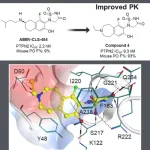(Press-News.org) Salt marsh restoration can mitigate flood risk and bolster community resilience to climate change in our local waterways, according to a recent study published in Nature by a postdoctoral fellow with UC Santa Cruz’s Center for Coastal Climate Resilience (CCCR).
The study, titled “The value of marsh restoration for flood risk reduction in an urban estuary,” explores the social and economic advantages of marsh restoration amidst the growing threats of sea level rise and storm-driven flooding. Climate change will put many communities at risk. In California, some of the study co-authors from the U.S. Geological Survey (USGS) have shown that 675,000 people and $250 billion in property are at risk of flooding in a scenario with 2 m of sea level rise combined with a 100-year storm. Flooding due to sea-level rise is amplified by storms, which drive higher coastal water levels via surges, waves, and increased river discharge, along with increasing coastal population density.
To simulate marsh restoration, the research team used a hydrodynamic model of San Francisco Bay, focusing on San Mateo County, the county most vulnerable to future flooding in California. The team ran computer simulations of the county’s shoreline during storms, with and without marsh restoration, and worked closely with local flood managers and planners to incorporate their input into the model.
“The Bay Area is low-lying and densely populated, thus at significant risk for future climate change impacts, and home to really large areas of degraded habitat. We have found compelling evidence that marsh restoration can reduce flood risk to people and property locally, providing both community and ecosystem co-benefits,” said CCCR fellow Rae Taylor-Burns, whose research also appears in a Springer Nature blog.
Key findings from the study include:
Identification of priority areas in San Mateo County for salt marsh restoration to maximize socio-economic impacts in reducing flood risk.
Development of a detailed flood model to evaluate the risk of flooding with and without salt marshes locally, aiding in the planning and design of restoration projects.
The monetization of flood risk reduction benefits to identify cost-effective investments in marsh restoration, potentially attracting public and private funding.
The study underscores the broader implications of wetland restoration beyond flood protection, including carbon sequestration, habitat preservation, and recreational opportunities. It also makes the case for investments in nature-based solutions and community resilience that can help lessen future climate change impacts.
Researchers show the benefits of integrating salt marsh restoration into comprehensive climate resilience strategies in San Mateo County and estuaries worldwide that are facing similar threats. This could include funding from FEMA grant programs or Regional Measure AA, which provides approximately $500 million for marsh restoration throughout the San Francisco Bay. This work also supports identifying CA coastal wetlands as critical national infrastructure, as the Center has helped support coral reefs in Guam, Hawai’i, Puerto Rico, and the U.S. Virgin Islands.
“As we confront the escalating challenges posed by climate change, it is imperative that we explore innovative solutions to enhance community resilience," said Michael W. Beck, director of the Center for Coastal Climate Resilience and a co-author of the study. “Salt marsh restoration represents a nature-based approach that can complement traditional infrastructure and safeguard our coastal communities."
END
UC Santa Cruz researchers value salt marsh restoration as a crucial tool in flood risk reduction and climate resilience in the San Francisco Bay
2024-04-11
ELSE PRESS RELEASES FROM THIS DATE:
Insilico Medicine develops novel PTPN2/N1 inhibitor for cancer immunotherapy using generative AI
2024-04-11
In recent years, cancer immunotherapy, exemplified by PD-1 and its ligand PD-L1 blockade, has made remarkable advances. But while immunotherapy drugs offer new treatment possibilities, only about 20% to 40% of patients respond to these treatments. The majority either don't respond or develop drug resistance. Researchers are now looking for ways to enhance the scope of tumor immunotherapy in order to benefit a wider range of patients.
One such avenue is through the protein tyrosine phosphatase non-receptor type 2 (PTPN2) and its close superfamily member, PTPN1, identified in previous research as crucial modulators involved in the regulation ...
$318 million New York City community parks initiative is associated with increased use of urban parks in low-income neighborhoods
2024-04-11
A new study in JAMA Network Open led by researchers from the CUNY Graduate School of Public Health and Health Policy observed 28,322 park users across 54 neighborhood parks and found a clear association between park renovation and park use in low-income neighborhoods in New York City (NYC).
As the global trend toward urbanization continues, two thirds of the world’s population is predicted to live in cities by 2050. Amid the noise, stress, and crowding of city life, urban parks have the potential to provide opportunities for physical activity, mitigate heat and pollution, lower stress, and improve mental and social well-being, all of which can decrease the prevalence ...
Trapped in the middle: billiards with memory
2024-04-11
Adding one simple rule to an idealized game of billiards leads to a wealth of intriguing mathematical questions, as well as applications in the physics of living organisms. This week, researchers from the University of Amsterdam, including two master students as first authors – have published a paper in Physical Review Letters about the fascinating dynamics of billiards with memory.
Billiards: a mathematical mystery
An idealized version of the game of billiards has fascinated mathematicians for decades. The basic ...
A new spin on organic shampoo makes it sudsier, longer lasting
2024-04-11
While there’s no regulation in the U.S. for what’s in organic shampoos, they tend to contain ingredients perceived as safe or environmentally friendly. However, these “clean” shampoos separate and spoil faster than those made with synthetic stabilizers and preservatives. Now, researchers in ACS Sustainable Chemistry & Engineering demonstrate that a simple process — spinning organic shampoo at high speeds — improved the final products’ shelf lives and ability to clean hair.
Natural emulsifiers, such as xanthan gum and cetyl alcohol, ...
Nanoscale movies shed light on one barrier to a clean energy future
2024-04-11
DURHAM, N.C. -- Left unchecked, corrosion can rust out cars and pipes, take down buildings and bridges, and eat away at our monuments.
Corrosion can also damage devices that could be key to a clean energy future. And now, Duke University researchers have captured extreme close-ups of that process in action.
“By studying how and why renewable energy devices break down over time, we might be able to extend their lifetime,” said chemistry professor and senior author Ivan Moreno-Hernandez.
In his lab at Duke sits a miniature version of one such device. Called an electrolyzer, ...
American College of Lifestyle Medicine announces first two medical schools to earn highest recognition and certification for lifestyle medicine curriculum
2024-04-11
The American College of Lifestyle Medicine (ACLM) has announced that the University of South Carolina School of Medicine Greenville (SOMG) and Loma Linda University School of Medicine (LLUSM) are the first to earn the highest recognition of a “Platinum Plus” certification designation for the significant level of undergraduate lifestyle medicine curricula within their programs.
The Platinum Plus is the highest tier of certification that a medical school can receive from ACLM and indicates the incorporation of at least 100 hours of evidence-based lifestyle medicine content within the curriculum. This level of lifestyle medicine ...
Avi Wigderson receives ACM A.M. Turing Award for groundbreaking insights on randomness
2024-04-11
ACM, the Association for Computing Machinery, today named Avi Wigderson as recipient of the 2023 ACM A.M. Turing Award for foundational contributions to the theory of computation, including reshaping our understanding of the role of randomness in computation, and for his decades of intellectual leadership in theoretical computer science.
Wigderson is the Herbert H. Maass Professor in the School of Mathematics at the Institute for Advanced Study in Princeton, New Jersey. He has been a leading figure in areas including computational complexity theory, algorithms and optimization, randomness and cryptography, parallel and distributed computation, combinatorics, and graph theory, as well as ...
NAWI awarded funding to continue to accelerate research and development for a secure water future
2024-04-11
– By Lauren Core
The National Alliance for Water Innovation (NAWI), which is led by the Department of Energy’s (DOE) Lawrence Berkeley National Laboratory (Berkeley Lab), has been extended for five more years with $75 million in funding from DOE. NAWI will continue its contributions to helping decarbonize the water and wastewater sectors through investments in technologies that enhance the efficient use of energy for water use, treatment, and distribution.
“Water and energy are interdependent – water is used to produce nearly every major energy source, and ...
2024 Research Fellowship Awards to support three exciting disease intervention research projects
2024-04-11
Systems Biology Ireland (SBI) at University College Dublin (UCD) and The Quantitative Biosciences Institute (QBI) at the University of California, San Francisco (UCSF), and) have announced the 2024 winners of the joint Research Fellowship Awards (RFAs).
The Research Fellowship Awards aim to support collaborative high quality and ground -breaking research proposals from QBI-UCSF and UCD in the areas of network biology and drug/drug target discovery.
The winning projects for 2024 are:
“Overcoming Resistance to HER2-Targeted Therapies in Breast Cancer,” ...
Laura Soucek receives an ERC Advanced Grant to maximize the clinical and preclinical use of the first viable MYC inhibitor
2024-04-11
Laura Soucek, an ICREA Research Professor, Director of VHIO’s Experimental Therapeutics Program, and Head of our Models of Cancer Therapies Group, has received a European Research Council (ERC) Advanced Grant to maximize the use of the first clinically viable MYC inhibitor.
This ERC funding program is amongst the EU’s most prestigious and competitive, providing leading senior researchers with the opportunity to pursue ambitious, curiosity-driven projects that could lead to major scientific breakthroughs. The new grants, worth in total nearly €652 million, are part of the EU’s Horizon Europe programme. ...




